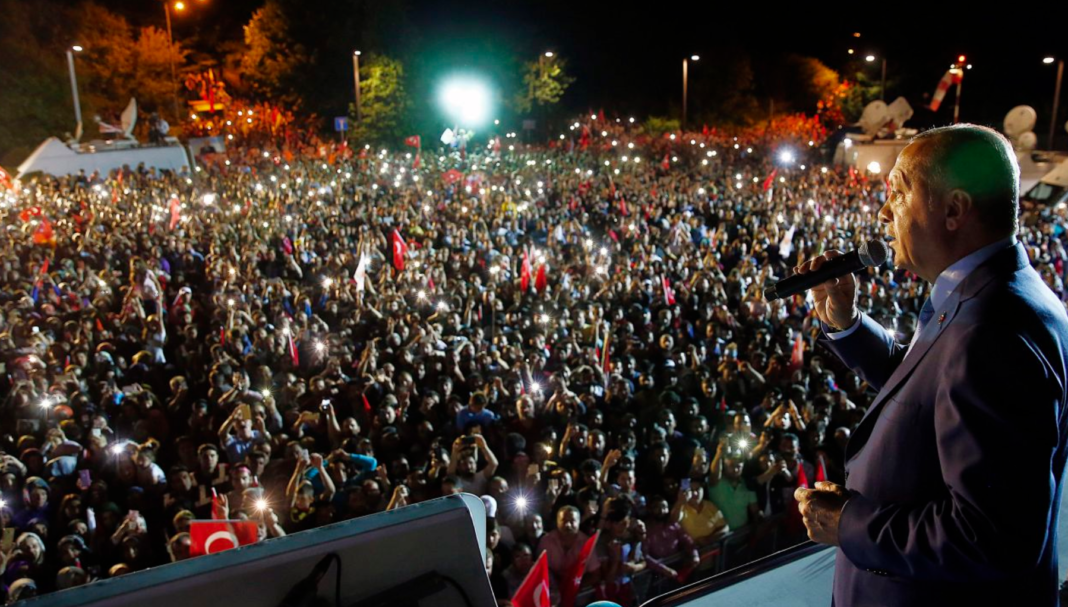« The popularity of Turkish President Recep Tayyip Erdogan and his party has hit a two-year high following a huge boost in spending and steps that have benefited millions of voters ahead of elections due in May » reports Ragip Soylu in Middle East Eye, on February 1, 2023.
Multiple public and private polls reviewed by Middle East Eye indicate that public support for Erdogan has returned to February 2021 levels, well before the inflation shock – which was triggered by his unorthodox monetary policy – hit the country later that year.
Two large private polls conducted in January showed that 40-42 percent of respondents said they would vote for Erdogan in the upcoming elections, while his ruling Justice and Development Party (AKP) and its coalition partner Nationalist Movement Party (MHP) together edged the same levels of support.
A public survey run by the Center for Social Impact Studies (Team) on 11-14 January, which included face-to-face interviews with 2,524 people in 16 provinces, put AKP at 37.5 percent and MHP at 6.5 percent, reaching 44 percent combined.
Team said in its report that the Erdogan-led People’s Alliance took a lead of 2.7 points, closing the gap from last year when the Nation Alliance, led by the main opposition Republican People’s Party (CHP), had a 5.6 point advantage.
‘A last chance’
Team research director Ulas Tol believes a significant jump for the ruling party was only natural, following Erdogan’s steps to assist the large numbers of people hurt by Turkey’s deteriorating economy.
“Because there was a slight recovery from the bottom of economic problems that led to the feeling that things are getting better,” Tol told MEE.
“The problems still continue, but the effects of the problems on voter sentiments have decreased because they got used to the crisis and the impact of the inflation is being felt less.
“Erdogan’s personal vote is on par with his coalition’s votes in our research.”
Analysts say Erdogan’s election spending has so far had a practical impact on people’s daily lives. With more than 50 percent of the Turkish public receiving a minimum wage, Erdogan hiked the minimum wage for the private sector by 94 percent in January 2023 year-on-year, while annual inflation slowed down and then stayed at around 64 percent.
A similar hike was made for the public sector, which has affected around five million people.
The government has also eliminated the retirement age requirement that allows two million Turkish workers to retire immediately, launched a cheap mortgage loan scheme for citizens who don’t own their own home, and issued a tax debt relief for millions of people.
Tol said that taken alone, each of the government’s “populist” steps amounts to little, but combined they have had a positive impact on voters, convincing them that Erdogan was trying his best to fulfil their needs.
“He affected the sentiment that they should grant him a last chance,” Tol said.
‘Opposition still has a way’
Another advantage Erdogan has so far enjoyed is the lack of a rival, as the opposition coalition, called Table of Six, is yet to propose a joint candidate.
Multiple sources told MEE that CHP leader Kemal Kilicdaroglu would be declared the contender in mid-February. However, the never-ending series of meetings between the six opposition leaders over the past six months appears to have tired the public, which believes they lack coherence.
There has been infighting over the selection of the candidate. Sources suggest Meral Aksener, the leader of nationalist opposition Good Party (IYI), favoured either of the popular Istanbul and Ankara mayors, Ekrem Imamoglu and Mansur Yavas respectively, as the joint contender, with both polling much better than Kilicdaroglu against Erdogan.
Table of Six released a memorandum on joint policies earlier this week that promised an orthodox monetary policy, a parliamentary government system and a series of uncontroversial social reforms and aids.
Osman Sert, research director at the Ankara-based research and consultancy firm PanoramaTR, agrees that the opposition appears to be disorganised.
“There is a sense for the voters that the campaign is not managed well,” Sert told MEE. “But Erdogan has been able to change the perception of a failing leader. Voters now perceive his short-term performance as positive.”
Sert says despite Erdogan’s surging popularity across the polls, including PanaromaTR’s own survey, he is still 8-10 points short of the 50 percent threshold required in the first round for the presidential mandate.
“If the opposition can choose the right candidate and actively rally around him against Erdogan, they will still have the upper hand,” he added. “Erdogan needs to double the gains he made so far, and the majority of the indecisive voters are opposition-leaning.”
Tol adds that the opposition still has a way in, since populist spending by the government has a short-term expiration date.
« The opposition needs to remind the voters about the past, » he said. « They need to focus on the government’s vulnerability in economy, education, health and urbanisation – as well as perception among the voters on moral corruption within the justice system and a sense of need for revitalisation in the government. »
À Lire aussi Turkey: Erdogan is boosting salaries and social services to win elections
Middle East Eye, February 1, 2023, by Ragip Soylu.

